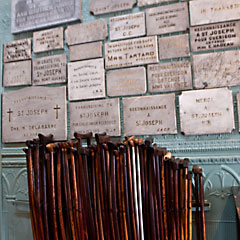 Thousands of people during Brother André’s lifetime and more since his death in 1937 have claimed the humble brother’s prayers healed them, cured them, made them whole. There are racks of abandoned crutches, canes and wheelchairs on display in St. Joseph’s Oratory.
Thousands of people during Brother André’s lifetime and more since his death in 1937 have claimed the humble brother’s prayers healed them, cured them, made them whole. There are racks of abandoned crutches, canes and wheelchairs on display in St. Joseph’s Oratory.
The problem for the postulator of Brother André’s cause was how to decide on just one miracle to present to medical and theological experts. When Andrea Ambrosi became postulator of Brother André’s cause in 2002, he had to find the right miracle to move the cause forward.
Brother André: A saintly life
By Catholic Register Staff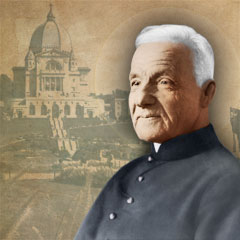 Canada’s next saint has always simply been known as Brother André, nothing more. But when Pope Benedict XVI declares him a saint in Rome Oct. 17, what title will he be given?
Canada’s next saint has always simply been known as Brother André, nothing more. But when Pope Benedict XVI declares him a saint in Rome Oct. 17, what title will he be given?
“We don’t know,” said Danielle Decelles, a spokesperson for St. Joseph’s Oratory. “For us in Montreal, he is St. Brother André.”
Rome has not revealed to the archdiocese of Montreal or St. Joseph’s Oratory what title Brother André will be given in the document proclaiming his sainthood. That will be revealed Oct. 17, said Decelles.
Brother André’s compassionate spirit changed thousands of lives
By Michael Swan, The Catholic Register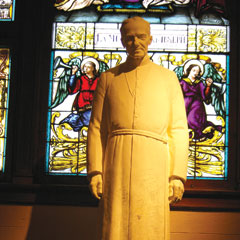 It is probable that Brother André would not approve of being made a saint. Or perhaps not even comprehend it.
It is probable that Brother André would not approve of being made a saint. Or perhaps not even comprehend it.
Once on a tour of the exile Quebecois towns of New England, the already famous Brother André arrived in a place where the priest and the whole French-speaking community anxiously waited. He was already known as the “Miracle Man of Montreal.” The Connecticut pastor had organized a procession and the people greeted Brother André with a great feast. The whole community turned out to pray the rosary.
A lens in the labyrinth of the refugee slums
By Michael Swan, The Catholic Register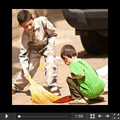 Take a look at Za Aytiryya, the neighbourhood where Iraqi Christian refugees live in Beirut. Or take a tour the Umayyad Mosque in Damascus for a glimpse of a Muslim world. Or meet the child refugees whose lives are also on hold, waiting for resettlement.
Take a look at Za Aytiryya, the neighbourhood where Iraqi Christian refugees live in Beirut. Or take a tour the Umayyad Mosque in Damascus for a glimpse of a Muslim world. Or meet the child refugees whose lives are also on hold, waiting for resettlement.
These three slide shows give another view of the shrinking world of Iraqi refugees.
Iraqi refugees prisoners in their Christian locales
By Michael Swan, The Catholic Register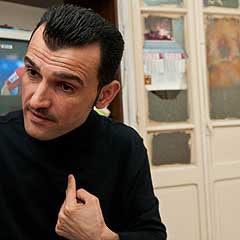 The 10,000-plus Iraqis in Lebanon have no legal status. Lebanon never signed the United Nations Convention on Refugees. The country has no legal or administrative mechanism to deal with a person seeking asylum of any kind. While it does recognize Palestinian refugees, they are an exception.
The 10,000-plus Iraqis in Lebanon have no legal status. Lebanon never signed the United Nations Convention on Refugees. The country has no legal or administrative mechanism to deal with a person seeking asylum of any kind. While it does recognize Palestinian refugees, they are an exception.
The police are not actively trying to round up refugees and put them in jail or send them out of the country. As long as they don’t wander out of the Christian neighbourhoods of Beirut or otherwise draw attention, authorities are willing to pretend they’re not there.
Deborah Amos no longer recognizes Middle East she has known since 1983
By Michael Swan, The Catholic Register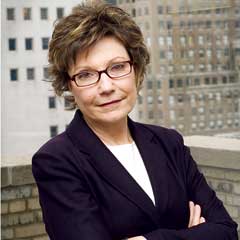 The biggest and best story of Deborah Amos’s 28-year career as a Middle East correspondent comes in the form of an eminently readable, fast-paced book about the Iraqi refugee crisis — Eclipse of the Sunnis: Power, Exile and Upheaval in the Middle East.
The biggest and best story of Deborah Amos’s 28-year career as a Middle East correspondent comes in the form of an eminently readable, fast-paced book about the Iraqi refugee crisis — Eclipse of the Sunnis: Power, Exile and Upheaval in the Middle East.
Amos spent five years among Iraq’s two million exiles, sipping tea with them in tiny, crumbling, empty apartments in the poor Geramana neighbourhood of Damascus, retracing their journeys from Baghdad by taxi, tracking them down after they resettled in the United States. Out of the whirlwind of “shock and awe” attacks on Baghdad in 2003, and the confusing rhetoric about weapons of mass destruction and regime change and democratizing the Middle East, Amos discovered that the key to understanding what was happening in Iraq was in the people streaming out of Iraq.
Mississauga parish helps families adjust to a new life
By Sheila Dabu Nonato, The Catholic Register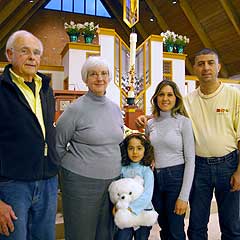 Mississauga, ON. - In Iraq, they lived under the threat of bombs and bullets. In Canada, Fawaz Fatohi says his daughter Dana is free to play in the park as any five-year-old should.
Mississauga, ON. - In Iraq, they lived under the threat of bombs and bullets. In Canada, Fawaz Fatohi says his daughter Dana is free to play in the park as any five-year-old should. Fatohi’s family was sponsored last year by St. Dominic’s parish in Mississauga, Ont. They had been living as refugees in Syria after fleeing Iraq.
St. Dominic’s parishioners say helping refugee families come to Canada is just part of who they are as a faith community. The experience, from both sides, has been rewarding.
Archdiocese of Toronto Office for Refugees after 15 short months
By Carolyn Girard, The Catholic Register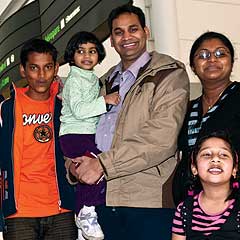 TORONTO - Helping refugees is a prime example of what it means to “go in peace to love and serve the Lord,” says Toronto Archbishop Thomas Collins, and through the archdiocese’s Office for Refugees (ORAT) Catholics have been able to follow Christ’s example in caring for others.
TORONTO - Helping refugees is a prime example of what it means to “go in peace to love and serve the Lord,” says Toronto Archbishop Thomas Collins, and through the archdiocese’s Office for Refugees (ORAT) Catholics have been able to follow Christ’s example in caring for others.
“It is a tremendous blessing to have the Office for Refugees working in our archdiocese,” Archbishop Thomas Collins said in a written statement. “We have seen countless examples of our parishes embracing strangers from foreign lands and journeying with them as they begin life in a new country and community.”
More efficiency needed for Iraqi refugee resettlement
By Catholic Register Staff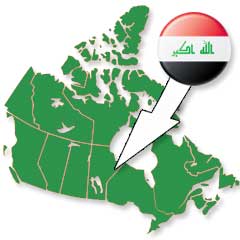 Canada is either the number two or number three country after the United States in terms of taking on Iraqi refugees, depending on how we measure it.
Canada is either the number two or number three country after the United States in terms of taking on Iraqi refugees, depending on how we measure it.From 2007 to 2009 the UNHCR in Syria submitted 3,280 applications from verified Iraqi refugees for resettlement in Canada. That’s second to the 27,406 who were submitted for resettlement in the United States.
Little miracles make up Martin Mark's ministry of hope
By Carolyn Girard, The Catholic Register TORONTO - Martin Mark knows from experience how hard it is to start a new life in an adopted homeland. That’s why the director for the Office for Refugees of the Archdiocese of Toronto (ORAT) is passionate about helping refugees successfully settle in Canada.
TORONTO - Martin Mark knows from experience how hard it is to start a new life in an adopted homeland. That’s why the director for the Office for Refugees of the Archdiocese of Toronto (ORAT) is passionate about helping refugees successfully settle in Canada.Ten years ago Mark was a refugee. He was welcomed into Canada after fleeing his native Hungary, where he had become a target of factions who resented his work on behalf of victims of racism.
12 per cent of world's refugees from Iraq
By Catholic Register Staff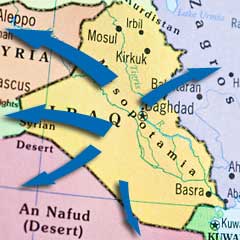 There are some 16 million refugees in the world, and another 26 million internally displaced people — people who haven’t crossed a border but still can’t go home.
There are some 16 million refugees in the world, and another 26 million internally displaced people — people who haven’t crossed a border but still can’t go home.Of the total, Iraq accounts for 1.9 million or 12 per cent of the world’s refugees, to say nothing of 2.6 million internally displaced Iraqis.

